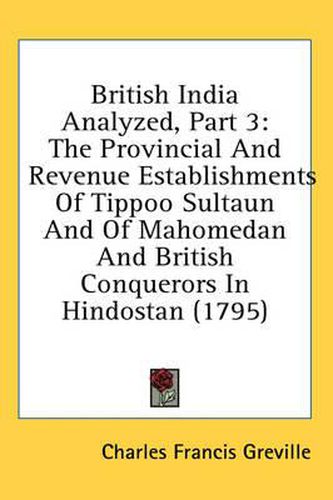Readings Newsletter
Become a Readings Member to make your shopping experience even easier.
Sign in or sign up for free!
You’re not far away from qualifying for FREE standard shipping within Australia
You’ve qualified for FREE standard shipping within Australia
The cart is loading…






British India Analyzed, Part 3: The Provincial And Revenue Establishments Of Tippoo Sultaun And Of Mahomedan And British Conquerors In Hindostan (1795) is a historical book written by Charles Francis Greville. The book is the third part of the British India Analyzed series and focuses on the provincial and revenue establishments of Tippoo Sultaun and Mahomedan and British conquerors in Hindostan.The book provides a detailed analysis of the administrative and revenue systems of Tippoo Sultaun, a ruler of the Kingdom of Mysore in southern India, and the Mahomedan and British conquerors of Hindostan, which refers to the northern part of India. Greville examines the various revenue sources and tax systems employed by these rulers, as well as the organization and structure of their provincial administrations.The book also includes a discussion of the political and social context of British India during the late 18th century, including the East India Company's increasing influence and control over Indian territories. Greville provides insights into the complex relationships between the British, the Mahomedan rulers, and the Indian population, shedding light on the power dynamics and cultural clashes that characterized this period of Indian history.Overall, British India Analyzed, Part 3: The Provincial And Revenue Establishments Of Tippoo Sultaun And Of Mahomedan And British Conquerors In Hindostan (1795) is a valuable resource for scholars and historians interested in the history of British India and the complex political and economic systems that shaped it.In Three Parts.This scarce antiquarian book is a facsimile reprint of the old original and may contain some imperfections such as library marks and notations. Because we believe this work is culturally important, we have made it available as part of our commitment for protecting, preserving, and promoting the world's literature in affordable, high quality, modern editions, that are true to their original work.
$9.00 standard shipping within Australia
FREE standard shipping within Australia for orders over $100.00
Express & International shipping calculated at checkout
Stock availability can be subject to change without notice. We recommend calling the shop or contacting our online team to check availability of low stock items. Please see our Shopping Online page for more details.
British India Analyzed, Part 3: The Provincial And Revenue Establishments Of Tippoo Sultaun And Of Mahomedan And British Conquerors In Hindostan (1795) is a historical book written by Charles Francis Greville. The book is the third part of the British India Analyzed series and focuses on the provincial and revenue establishments of Tippoo Sultaun and Mahomedan and British conquerors in Hindostan.The book provides a detailed analysis of the administrative and revenue systems of Tippoo Sultaun, a ruler of the Kingdom of Mysore in southern India, and the Mahomedan and British conquerors of Hindostan, which refers to the northern part of India. Greville examines the various revenue sources and tax systems employed by these rulers, as well as the organization and structure of their provincial administrations.The book also includes a discussion of the political and social context of British India during the late 18th century, including the East India Company's increasing influence and control over Indian territories. Greville provides insights into the complex relationships between the British, the Mahomedan rulers, and the Indian population, shedding light on the power dynamics and cultural clashes that characterized this period of Indian history.Overall, British India Analyzed, Part 3: The Provincial And Revenue Establishments Of Tippoo Sultaun And Of Mahomedan And British Conquerors In Hindostan (1795) is a valuable resource for scholars and historians interested in the history of British India and the complex political and economic systems that shaped it.In Three Parts.This scarce antiquarian book is a facsimile reprint of the old original and may contain some imperfections such as library marks and notations. Because we believe this work is culturally important, we have made it available as part of our commitment for protecting, preserving, and promoting the world's literature in affordable, high quality, modern editions, that are true to their original work.